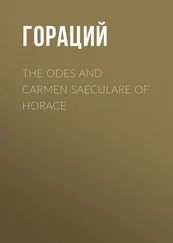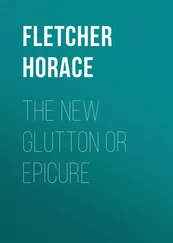Horace Fletcher - Fletcherism
Здесь есть возможность читать онлайн «Horace Fletcher - Fletcherism» — ознакомительный отрывок электронной книги совершенно бесплатно, а после прочтения отрывка купить полную версию. В некоторых случаях можно слушать аудио, скачать через торрент в формате fb2 и присутствует краткое содержание. Жанр: foreign_antique, foreign_prose, на английском языке. Описание произведения, (предисловие) а так же отзывы посетителей доступны на портале библиотеки ЛибКат.
- Название:Fletcherism
- Автор:
- Жанр:
- Год:неизвестен
- ISBN:нет данных
- Рейтинг книги:3 / 5. Голосов: 1
-
Избранное:Добавить в избранное
- Отзывы:
-
Ваша оценка:
- 60
- 1
- 2
- 3
- 4
- 5
Fletcherism: краткое содержание, описание и аннотация
Предлагаем к чтению аннотацию, описание, краткое содержание или предисловие (зависит от того, что написал сам автор книги «Fletcherism»). Если вы не нашли необходимую информацию о книге — напишите в комментариях, мы постараемся отыскать её.
Fletcherism — читать онлайн ознакомительный отрывок
Ниже представлен текст книги, разбитый по страницам. Система сохранения места последней прочитанной страницы, позволяет с удобством читать онлайн бесплатно книгу «Fletcherism», без необходимости каждый раз заново искать на чём Вы остановились. Поставьте закладку, и сможете в любой момент перейти на страницу, на которой закончили чтение.
Интервал:
Закладка:
Then I was examined for heart-action, steadiness of nerve, muscle, etc., and was found to be all right, with no evidence of strain. A glass brimming full of water was placed first in one hand and then in the other, and was held out at arm's length without spilling any of the water.
Next morning I was examined for evidence of soreness, but none was present. There was the normal elasticity and tone of muscle.
Later in that same year, at the International Young Men's Christian Association Training School at Springfield, Massachusetts, I lifted seven hundred and seventy pounds with the muscles of the back and legs – a feat that weight-lifting athletes find hard to perform. And I did these stunts eating two meals a day, one at noon and the other at six o'clock, at an average cost of eleven cents a day.
Still another examination at the University of Pennsylvania resulted in my breaking the College record of lifting power with the back muscles. I do not cite these instances as feats of extraordinary prowess, but just to show the difference in my condition then and twenty years before. All this I have done simply by keeping my body free of excess of food and the poisons that come from the putrefaction of the food that the organism does not want and cannot take care of.
As to myself, I am now past sixty-four. I weigh one hundred and seventy pounds, which is a good weight for my height. During the many years of experiment I have ranged between two hundred and seventeen and one hundred and thirty pounds, but have "settled down" to my present quite convenient figure. I feel perfectly well; I can do as much work as can a man of forty – more than can the average man of forty, I believe. I rarely have a cold, and although I am always careless in this regard, my work is never delayed. I do not know what it is to have "that tired feeling," except as expressed by sleepiness. When I get into bed I scarce ever remember my head striking the pillow, and after four and one-half hours I awake from a dreamless slumber with a happy waking thought in process of formation.
I usually find it agreeable to court supplemental naps, to be followed by more pleasant waking thoughts: but these are pure luxury. I can do with five hours sleep if need be.
CHAPTER III
Let Nature Choose the Meals – How Many Meals a Day? – Housewives – Fletcherism – The Financial Economy of Fletcherism – Business People and Fletcherism – The True Epicure
What do I eat?
When do I eat?
How much do I eat?
My answer to all these questions is very simple. I eat anything that my appetite calls for; I eat it only when it does call for it; and I eat until my appetite is satisfied and cries "Enough!"
With my New England food preferences, my range of selection circulates among a very simple and inexpensive variety, namely, potatoes, corn-bread, beans, occasionally eggs, milk, cream, toast-and-butter, etc.; and combinations of these, such as hashed-browned potatoes, potatoes in cream, potatoes au gratin , baked potatoes, potato pats, fish-balls – mainly composed of potato; occasionally tomato stewed with plenty of powdered sugar; oyster stew with the flavour of celery; escalloped oysters, etc. The taste for fruits is always suitable to the season, and is intermittent, strong leanings towards some particular fruit persisting for a time and then waning to give place to some other preference.
But with all my fifteen or twenty years of unremitting study of the subject, I cannot now tell what my body is going to want to-morrow. But Nature knows, and she alone knows.
Once in Venice a group of experimenters, of which I was one, subsisted on milk alone. During seventeen days nothing but milk, always from the same cow, and fresh from the milking, passed my lips in the way of food or drink. I sipped the milk, and tasted it for all the taste there was in it, and I learned to be so fond of it that it was with some difficulty that I went back to a varied diet when the experiment called for a change. Good, fresh milk is an exception to Nature's dislike for monotony in food. Milk is the one perfectly-balanced food material; and while it may not be always the best food for grown persons, it is the most acceptable as a monotonous diet, and always is good, sufficient and safe nutriment, if sipped, tasted, and naturally swallowed.
I have forgotten just what the exact quantity was that I consumed daily during those seventeen days – I believe it was about two quarts. I get away as far as possible from quantitative amounts, which may influence other persons. The appetite is the only true guide to bodily need; and if milk is tasted and swallowed only by involuntary compulsion as required by right feeding, the appetite will gauge the bodily need exactly, and cut off short when enough for the moment has been taken.
So I say to all who ask me these questions as applied to themselves: I cannot advise you appropriately what to eat, when to eat, nor how much to eat; neither can anybody else. Trust to Nature absolutely, and accept her guidance.
If she calls for pie, eat pie. If she calls for it at midnight eat it then, but eat it right. Understand the food filter at the back of the mouth as I have described it in a previous article, and use it in connection with the pie. If it is used properly, and all the taste is extracted from the pie, and it is swallowed only in response to the natural opening of the gate, and if the ingredients of the pie that are not swallowed naturally are removed from the mouth, nothing will happen to disturb profound sleep.
Few persons will crave mince pie or Welsh rarebit late at night. The worker on a morning paper may do so, and often does. He has earned his appetite, and sometimes it is so robust as to call for mince pie or Welsh rarebit; but if these are eaten properly they will then be utilised by the body, eagerly and easily.
I dwell purposely upon this extravagance of eating. It is to accentuate the fact that we want to get as far away as possible, when cultivating vital economies, from the idea of extraneous advice in the matter of food.
The ordinary person will probably find his appetite leaning towards the simplest of foods, and away from frequency of indulgence. If the breakfast is postponed until a real, earned appetite has been secured, the mid-day or later breakfast (remember always that breakfast means the first meal of the day, no matter when taken) will be so enjoyable a meal, and the appetite will be so entirely satisfied that there will be no more demand for food until evening, and possibly not even then.
I am often asked if it is true that I eat only two meals a day; that I never eat breakfast, and why I have dropped that meal.
I have two meals a day more habitually than any other number, but not with any prescribed regularity, for the reason that my activities are most irregular at times, and my appetite accommodates itself to my needs.
When I am doing work under the most favourable of conditions, one meal a day is the rhythm best appreciated by my body. But the question of "How many meals a day?" is tantamount to the inquiry as to the amount of sleep needed: it is a matter of satisfaction of the natural requirements. The harder one works, the faster one runs, etc., the more air he needs. The same applies to the need for food according to the amount of heat eliminated, and the repair material consumed. The really hardest work that anybody does is done within the body. Muscular effort in normal conditions is not so waste-provoking and exacting as getting rid of excess of food and the counteraction of worry or anger. Likewise, idleness begets uneasiness, uneasiness begets desire for something (nobody knows just what), and groping around for "Don't know what" causes the temptation to eat and drink something which the body does not need; and then the really hard work of the body begins in the attempt of Nature to get rid of the excess. Excess of water can be thrown off in perspiration with comparative ease, but with excess of food it is different. The kidneys, bacteria and fuel furnaces of the body are all over-worked to get rid of it.
Читать дальшеИнтервал:
Закладка:
Похожие книги на «Fletcherism»
Представляем Вашему вниманию похожие книги на «Fletcherism» списком для выбора. Мы отобрали схожую по названию и смыслу литературу в надежде предоставить читателям больше вариантов отыскать новые, интересные, ещё непрочитанные произведения.
Обсуждение, отзывы о книге «Fletcherism» и просто собственные мнения читателей. Оставьте ваши комментарии, напишите, что Вы думаете о произведении, его смысле или главных героях. Укажите что конкретно понравилось, а что нет, и почему Вы так считаете.












